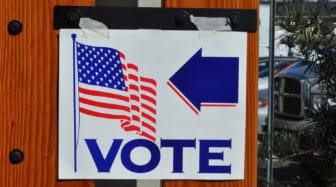A few details still need to be worked out, but elections officials in New Mexico’s two most-populous counties say they expect to let some 17-year-olds vote in the upcoming June 7 primaries.

Tom Arthur / Creative Commons
The legislation allowing some 17-year-olds to vote in primaries takes effect on May 18 — a few days after early voting for the June 7 primaries begins on May 10. (photo cc info)
Earlier this year the N.M. Legislature and governor gave approval to a bill that lets 17-year-olds who will be 18 on the date of the general election vote in the Democratic and Republican party primaries held in June. This year the general election is Nov. 8.
But there’s been some confusion about the date the bill takes effect. When first introduced by Rep. Jeff Steinborn, D-Las Cruces, the legislation contained an emergency clause — which would have meant the bill took effect immediately upon being signed by Gov. Susana Martinez and well in advance of this year’s primaries.
However, lawmakers stripped the emergency clause from the legislation before approving it in February. The Santa Fe New Mexican reported at the time that the bill “would not go into effect until July 1, some three weeks after this year’s primary election in New Mexico. That means the soonest 17-year-olds would vote in a state primary would be 2018.”
While a July 1 effective date may have been the intent of some legislators, that’s not when this bill takes effect. As mandated by the New Mexico Constitution, bills without any specified effective date — like this one — take effect 90 days after the legislative session adjourns.
In this case, that means the legislation allowing some 17-year-olds to vote in primaries takes effect on May 18 — a few days after early voting for the June 7 primaries begins on May 10.
Confusion about the law’s implementation became public on Monday, when the news organization New Mexico Political Report published an article quoting the chief of staff in the Secretary of State’s Office, Ken Ortiz, as saying the office is “exploring the legal options to assure the law is implemented appropriately.”
“He did not provide an answer to a direct question on whether 17-year-olds would be able to vote in the upcoming primaries,” the article states.
Ortiz and another official from the Secretary of State’s Office didn’t respond Tuesday to an email from NMPolitics.net seeking clarification.
But elections officials in Bernalillo and Doña Ana counties say the law is clear and they’re ready to proceed with allowing qualifying 17-year-olds to vote in this year’s primaries. Maggie Toulouse Oliver, the Bernalillo County clerk, and Scott Krahling, Doña Ana County’s chief deputy clerk, said county and state elections officials met last week and discussed the bill’s requirement that it take effect in time for this year’s primaries.
“We all left with the understanding that this is happening — and it’s only a matter of how, not if,” Krahling said. “In fact, I don’t think we have an option, given that the law passed and it goes into effect before Election Day.”
Oliver agreed.
“Yes, the collective understanding is that this law will be implemented as of May 18th,” she said.
The deadline to register to vote in the June primaries is May 10. People who will be 18 or older by the next general election can register now online, at their county clerk’s office, or through a certified agent working for an independent group.
New Mexico’s primaries are closed, meaning only Democrats can vote in the Democratic primary and only Republicans can vote in the Republican primary. So while 22 percent of registered voters in New Mexico are independents or belong to other political parties, the new law benefits only 17-year-olds who plan to register with one of the two major parties.
There are some details to work out, which may explain the lack of clarity from the Secretary of State’s Office. Oliver said the state needs to resolve some questions about the technical process of making 17-year-olds eligible to vote in the June primaries and then ineligible to vote again until they turn 18.
Steinborn said he’s partly responsible for the confusion about whether the law would apply this year. After his colleagues took out the emergency clause, he believed the bill would take effect July 1 and some 17-year-olds could start voting in primaries in 2018.
“I’ve never been more happy to be wrong,” Steinborn said. “… I am thrilled about the bigger reality that they are in fact going to get to vote in the primary. What a great opportunity to get young people involved in this presidential election.”
Krahling said his office expects to hear soon from the Secretary of State’s Office on final details of how the new law will be implemented.
“We can and should allow these people to vote in the primary, and we’re excited to welcome them,” Krahling said.
Almost half of the 50 states already allow 17-year-olds who will be 18 by the general election to vote in primaries or caucuses, according to the organization FairVote. That’s legal even though the federal voting age is 18 because, technically, primaries and caucuses are a party nominating process leading up to the actual election in November.
Earlier this year, a judge in Ohio overturned that state’s law banning 17-year-olds who would be 18 by the general election from voting in primaries.
